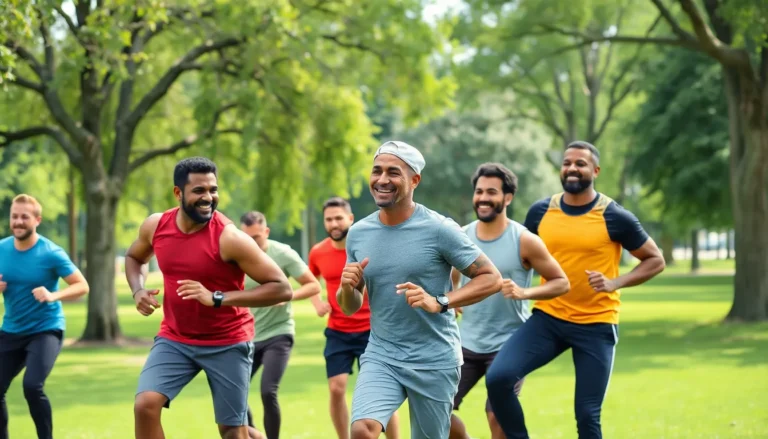In a world where avocado toast reigns supreme and yoga pants have become a second skin, a lifestyle shift isn’t just a trend—it’s practically a rite of passage. Whether it’s swapping late-night Netflix binges for sunrise yoga sessions or trading fast food for kale smoothies, people everywhere are embracing healthier, more mindful living. It’s like a cosmic nudge to step away from the couch and dive headfirst into a life that feels just a little more alive.
Table of Contents
ToggleUnderstanding Lifestyle Shift
A lifestyle shift involves making deliberate changes to daily habits and routines. This transformation encompasses various areas of life, including nutrition, exercise, and mental well-being.
Definition of Lifestyle Shift
A lifestyle shift refers to a significant change in an individual’s habits and routines that supports healthier living. This change might include adopting healthier dietary practices, increasing physical activity, or prioritizing mental health through mindfulness and self-care. Often, these shifts challenge longstanding habits that no longer serve one’s well-being. People initiate lifestyle shifts for various reasons, such as enhancing physical health, improving emotional stability, or even raising awareness about the benefits of sustainable living.
Importance of Lifestyle Shifts
Lifestyle shifts carry substantial importance for overall health and well-being. They foster physical health by reducing the risk of chronic diseases such as obesity, diabetes, and cardiovascular conditions. Emotional benefits emerge through improved self-esteem and mental resilience. Moreover, embracing a healthy lifestyle can create a more balanced approach to life, encouraging individuals to maintain consistent routines that promote long-term wellness. Sustainability plays a role as well, as adopting eco-friendly habits contributes to environmental health. Collective lifestyle changes can lead to widespread positive effects on communities and future generations.
Factors Influencing Lifestyle Shifts
Various factors contribute to lifestyle shifts, driving individuals toward healthier habits. Understanding these influences helps in recognizing the broader trends in well-being.
Social Influences
Social dynamics play a crucial role in lifestyle choices. Peer pressure impacts dietary habits, exercise routines, and mindfulness practices. Individuals often gravitate towards healthier living when surrounded by supportive friends. Family values also shape these shifts, encouraging collective participation in healthier activities. Community support enhances motivation, fostering engagement in group workouts or wellness classes. Social media can drive trends, showcasing healthy recipes and fitness challenges that inspire many. As connections deepen among social circles, commitment to healthier lifestyles often increases.
Technological Advances
Technological advancements significantly affect lifestyle changes. Access to health apps promotes awareness of nutrition and fitness goals. Wearable technology, like fitness trackers, encourages individuals to monitor physical activity and sleep patterns. Online platforms provide resources for meal planning, contributing to healthier eating habits. Virtual workout sessions have emerged, allowing participation from home while maintaining social interaction. Furthermore, telehealth services facilitate easier access to mental health support, breaking barriers to care. Innovations in technology create a supportive environment for embracing healthier living.
Benefits of Making a Lifestyle Shift
Making a lifestyle shift yields significant benefits for both physical health and mental well-being, fostering a more vibrant and fulfilling life.
Physical Health Improvements
Physical health improves dramatically with lifestyle shifts. Switching from fast food to nutrient-dense meals directly lowers obesity risks. Engaging in regular exercise enhances cardiovascular health, which decreases the chances of heart disease. Incorporating mindfulness practices, such as meditation or yoga, supports better sleep patterns. Studies show these changes can improve immune function, helping the body fend off illnesses. Overall, adopting healthier habits results in enhanced energy levels, making daily activities more enjoyable.
Mental Well-being Enhancements
Emotional well-being experiences notable enhancements through lifestyle changes. Prioritizing physical activity often leads to elevated mood, thanks to the endorphins released during exercise. Incorporating mindfulness techniques reduces stress and anxiety, fostering a calmer mindset. Moreover, community support, such as through group exercise classes, creates social connections that combat feelings of isolation. New healthy habits can also improve self-esteem, leading to a more positive self-image. Increased awareness of nutrition contributes to better mental clarity, allowing individuals to navigate daily challenges with greater ease.
Challenges in Implementing a Lifestyle Shift
Implementing a lifestyle shift presents several challenges that individuals may face. Recognizing these difficulties can aid in navigating them effectively.
Resistance to Change
Resistance to change emerges as a significant barrier. Many individuals find comfort in familiar routines, making it tough to adopt new habits. Fear of failure can also lead to reluctance, as people worry about not meeting their own expectations. Social influences often reinforce existing behaviors, hindering progress. Peer groups or family members may not share the same commitment to healthier choices, creating a sense of isolation. Acknowledging these factors facilitates a better understanding of personal motivations, thus easing the transition to a new lifestyle.
Overcoming Obstacles
Overcoming obstacles requires practical strategies and a focused mindset. Establishing small, achievable goals significantly improves success rates. Encouragement from friends or family can bolster motivation as accountability encourages persistence during challenging moments. Utilizing technology, such as fitness apps or meal planning tools, can streamline the transition and promote healthier habits. Seeking professional guidance, like consulting a nutritionist, adds structure and reinforces commitment to change. Collectively, these strategies support a smooth transition and foster resilience against setbacks.
Embracing a lifestyle shift can transform an individual’s approach to health and well-being. By making intentional changes in daily habits and routines, it’s possible to cultivate a more vibrant life. The journey may come with challenges but the rewards are significant. Improved physical health and enhanced mental clarity create a foundation for a more fulfilling existence.
As individuals adopt healthier practices, they not only benefit personally but also contribute to a larger movement toward community wellness. This collective effort can inspire future generations to prioritize well-being. Ultimately, a lifestyle shift is more than just a personal choice; it’s a powerful step toward a healthier, happier world.









